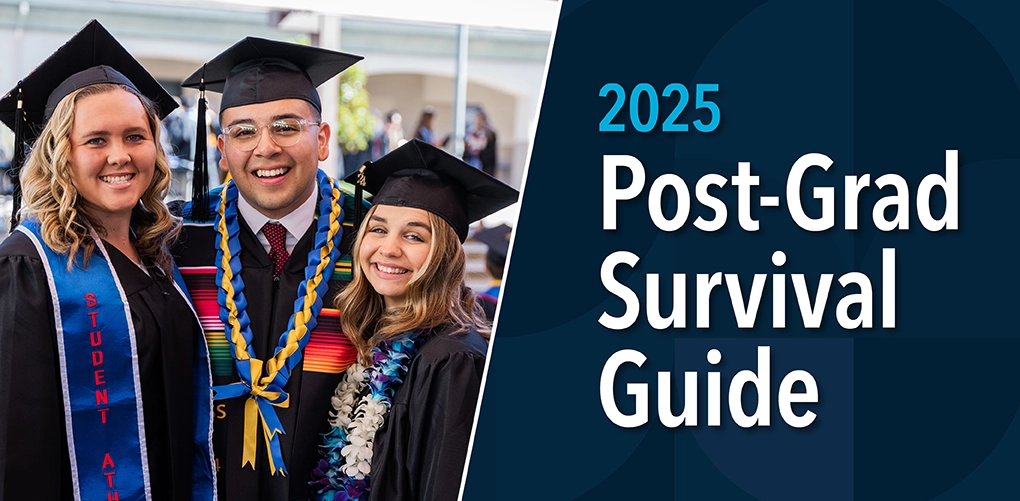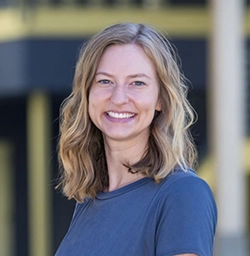
Post-Graduate Survival Guide
Congratulations! You are on your way to graduation and your Jessup family couldn’t be more excited for you as you embark on this new chapter in your life.
While graduation is a wonderful time, it also leads to an entirely new phase of life, one that is filled with uncertainty as you step into uncharted territory. However, you can walk in confidence because God is directing your steps through this chapter and into the next.
“The LORD directs our steps, so why try to understand everything along the way?” – Proverbs 20:24
From faculty, staff and alumni, this Post-Graduate Survival Guide is filled with encouragement, advice and support from your Jessup University community during this beautiful, messy and life-changing time.
Remember, you were meant to make a difference. Now, you’re ready!

The Indeterminable “In-Between”: College & Full-Time Work
Victoria Thompson, Asst. Director of University Events
There aren’t too many seasons in my life where I look back and wish I had that time back. However, I desperately wish I could relive the summer between when I graduated from college and started working full time. This “In-Between” season gets a bad rap. All the friends you would see every day are distant. All the expectations you had for yourself seem very far away as you sit in your childhood bedroom scrolling through LinkedIn, thinking about getting your old job at the mall back until you find something full-time. Let me challenge you to instead look forward to the “In-Between.”
You have something that you have never had before: Time. You have just spent your entire childhood, adolescence, and early adulthood going to class and doing homework. You will likely spend the next few decades working full time. My two pieces of advice are this: Build Lasting Habits and Do What Matters.
Life is routine-less in the “In-Between,” so build yourself something reliable and stick to it! Don’t sleep indefinitely every day; pick a time to wake up and keep that routine every day. Make a commitment to spending time reading the Bible every day. If you haven’t already, make sure that church is a habitual commitment, not a week-by-week decision. This is when you have time to do all of these things, I guarantee it will be significantly harder when you’re working 40 hours a week. Do your future self a favor and create habits that will last.
The main reason that I look back and yearn for the “In-Between” is because I had almost unlimited time to do meaningful things for God’s glory and my good. [Working full time is for God’s glory and my good, too, it just feels a little different!] Take this “In-Between” time and serve others. Look for people in your church that you can serve, whether that is a teenager who needs someone to look up to or someone older than you who just needs encouragement. Life gets busier in a moment, and serving gets 100x harder. Do things that enrich your soul: read books, go on day trips to the beach, experiment with different recipes, and make new friends. Really, the possibilities are endless!
Don’t let the “In-Between” be wasted as you long for another season of life, “Whatever you do, in word or deed, do all in the name of the Lord Jesus, giving thanks…” (Colossians 3:17).

Cultivating Community After Graduation
Deb Hay, Campus Min Connections Coordinator
Congratulations, Graduate! What an incredible achievement! First things first, celebrate this milestone. Seriously, don’t downplay it. You’ve worked hard, and you deserve to be recognized and celebrated by those around you.
One of the biggest transitions after college is adjusting to life without the built-in community that campus provides i.e. roommates, classmates, study groups, and spontaneous late-night conversations. As you step into this new season, your daily rhythms will shift. Work will take up most of your day, evenings will be for rest, and weekends will fill up with responsibilities you didn’t have before. It’s all too easy for community to slip away in the busyness of life.
My encouragement to you? Be intentional. Make connecting with friends, family, mentors, and church communities a priority. The sooner you create space for relationships in your new routine, the smoother your transition will be. We aren’t meant to do life alone! We need people! So, lean in. Check in. Schedule coffee dates. Start group chats. Show up for each other.
Don’t underestimate the power of small moments. Just recently, I was feeling emotionally exhausted, and my first instinct was to isolate myself. Instead, I invited a couple of friends on a spontaneous ice cream run. We talked, we prayed, and by the time I headed home, I felt a weight lifted. Those little moments matter more than you think.
Finally, recognize that the reality of post-grad life won’t hit all at once. For many, the “drop” happens later when you would normally be starting classes but, instead, find yourself navigating full-time work or job searching. Prepare your heart for this shift. Seek God in prayer, ask the Holy Spirit for wisdom in your next steps, and trust that Jesus will walk with you as a faithful friend.
I’m praying for you as you step into this next season. May God open doors, provide clarity, and surround you with the right people.
Be Blessed,
Deb

It’s Not Built In “Out There”
PC Walker, Resident Director
College is wonderful, right?! As you step into the vast, uncharted territory of “real life,” one of the most jarring transitions isn’t about the workload or responsibilities—it’s about your community. In college, meaningful friendships and mentorships were built into your daily experience. Your support network was delivered to your doorstep through shared classes, dorm life, and campus activities. Nobody tells you that maintaining this vital support system post-graduation requires deliberate effort.
The days of spontaneously running into friends at the caf or having professors with dedicated office hours are behind you. Cultivating meaningful friendships will now mean actively reaching out, scheduling time together, and sometimes traveling across town (or even farther) to nurture these connections. It’s easy to let friendships slide when life gets busy, but these relationships become even more crucial as you navigate career challenges, personal growth, and significant life decisions.
Similarly, mentorship doesn’t happen automatically once you leave campus. Finding guides offering wisdom for your professional, personal, and spiritual journey requires intentional searching and relationship-building. Look for potential mentors within your workplace, professional organizations, alumni networks, and community. Remember that mentorship doesn’t always need to be formal—sometimes it’s simply a coffee with someone whose path or life approach is one that you admire. Don’t be afraid to be vulnerable about what you’re struggling with or curious about.
Your effort to build these relationships will yield dividends throughout your life. While it might feel overwhelming to actively pursue friendships and mentorship alongside all your other adult responsibilities, think of it as an essential investment—not just in your career but in your overall well-being and sense of belonging in this next season.

Long Distance Friendship
Megan Springer, Resident Director
No one learns how to do adult friendships well, especially at college when you are naturally around your community all the time.
When you leave campus, have a 9-5 job, and don’t live in the same building as your friends, friendship feels different, and likely harder. Without the touch points of seeing someone in the stir fry line at the caf, sitting outside on the blue couches, or as you walk into chapel, our connections may feel less. Transitioning from campus life can be lonely, but it doesn’t have to be.
So, how do we combat this?
- Reach out. Don’t expect a friend to message first. If your friendship was built on a foundation of being in close physical proximity, it will be hard to keep up the relationship when you don’t have that anymore. Don’t assume the other person doesn’t want to connect, be willing to be the one to initiate a time to hangout!
- Recognize that some friendships are just for a season. This doesn’t negate the relationship, it just means that not all friendships are designed to be kept up once a life season is over.
- Be okay with long catch-up times that are less frequent, instead of constant contact that is less feasible to keep up with.
- Don’t mistake seeing someone’s social media updates as “staying connected.” True engagement with a friend means communication, not just liking a post or watching their content.
- Build connections where you are. College friends are so special and sweet, but don’t let that prevent you from engaging in finding new friends in the new season.
New community where you will land is also necessary and possible. And long distance friendship is possible with intentionality and realistic expectations. It may be hard but relationships, both old and new, are worth the work.

Sabbath Rest
Kayla Balangue, Assistant Director of Campus Ministries, Local & Global Outreach; Jessup Alumni
Graduating is such an exciting time, but it can also be an incredibly stressful time as you navigate potential new jobs, living arrangements, changes in community, and new rhythms of life. If you’re anything like me, you’ll quickly fill all of that time you used to spend doing homework with other responsibilities, without even realizing it. I learned (the hard way first) how necessary it was to prioritize a Sabbath day of rest every week.
Let me be clear, a Sabbath day is not just a “treat yo’ self” day, or a day to catch up on chores, or binge watch a show. It’s part of the rhythm of work and rest that includes ceasing, resting, embracing, and feasting. We cease from all work and the things that drain us. We rest in God’s presence. We embrace simplicity, our community, and our time with the Lord. And we feast with a good meal, celebrating all that God did the previous week and anticipating all that is to come in the week ahead.
In my own study of Scripture, the practice of Sabbath seemed to be pretty essential to the life of a follower of Jesus. In Genesis 2, God Himself models a day of rest after He creates the whole world, and then later includes Sabbath in the ten commandments for all of us in Exodus 20. In Exodus 16, the Lord taught the Israelites to trust Him with provision as they practiced Sabbath. In the New Testament, Jesus reminds us that the Sabbath was made for us (Mark 2) and the writer of Hebrews even reveals that the practice of Sabbath reflects the promise of our eternal rest with God.
Post-grad life can easily become filled with distractions and a constant striving towards the next thing. But practicing Sabbath reminds you that you are not what you produce or achieve. You are God’s beloved, and He is trustworthy and faithful to provide for your every need.
So in this next stage of life, make it a practice to prepare for a weekly Sabbath. Choose a day and be consistent to protect that day each week. Find the activities that are life-giving to you. Put your phone away and choose to create instead. In your solitude time, find how you best connect with God and allow Him to refresh your soul. Be intentional with your community, spend your time with people that make you laugh and leave you feeling filled up. You were created with a rhythm of work and rest in mind, so work hard and rest well. You got this!

Holding On To The Real You!
Erin Ambrose, School of Psychology
Congratulations!
I know you thought this day would never come and yet here it is. You may be thinking, “But now I’m not ready!” or “Shouldn’t I feel more ‘adult’ than this?” or “Everyone else seems to know what to do and I feel like an imposter.” Please take a deep breath. Okay, now take another one. One more…
The reality is, everyone feels uncertain in times of change and transitions. Although this is a big accomplishment and new doors will open for you as you graduate and move forward to what comes next, what hasn’t changed is the you that God intended is still YOU! And that is a very good thing.
Although you will graduate with a degree and a good amount of knowledge in your major, what has been added to your resume doesn’t remove what was there from the beginning and will remain with you throughout your life. The God who loves you, who created you, and designed you for the life you live is continuing to shape and mold you. This time is part of that shaping. You don’t need to worry about all the upcoming changes. Instead, allow yourself to dream and to imagine being you (the real you, the fun quirky you, the maybe a little dorky you) in new places and doing new things.
When we allow ourselves to BE ourselves, we can relax a bit more. Just hold on to the real you and enjoy the ride!
“For we are what He has made us, created in Christ Jesus for good works, which God prepared beforehand so that we may walk in them.” (Ephesians 2:10)

Finding Employment After Graduation
Emma Askew – Jessup Career Services Student Assistant; Jessup Nursing Major
1. Preparing for the Transition After Graduation: It is an exciting time, but it’s important to stay grounded and prepare well for what comes next. Begin the job-hunting process now—don’t wait until after you walk the stage. Gather written references from professors, coaches, or leaders you’ve connected with, and ask if they’d be open to providing future references, as well. Take note of how they describe your character, academic proficiency, communication skills, or motivation and rephrase those into soft skills for your resume. As you prepare to leave campus, make sure you’ve paid all debts to the institution so you can move forward with a clean slate.
2. Finding and Landing a Job: The job market can be tough, and competition is often intense, with single job openings attracting hundreds of applicants. Finding employment may take significant time, effort, and perseverance. Relying solely on online applications may not be enough—networking can open doors to hidden opportunities. Leverage the connections you’ve made with professors, students, alumni, friends, and family. Jessup’s tight-knit community can be a great resource, so take advantage of it. Don’t overlook any opportunity, and be realistic: most graduates start in entry-level positions that involve long hours and low pay. Still, these roles often offer valuable experience and the chance to move up.
3. Navigating the Professional World: While your Jessup education and possible internship experience have prepared you well, expect the unexpected. You’ll need to collaborate with many types of people, some of whom may be difficult to work with. Jobs will require teamwork, professionalism, and the ability to manage both time and responsibilities. Your college degree qualifies you for a position, but it’s your skills, work ethic, and contributions that will help you succeed. Your first job may not match your dreams, and that’s okay. It could simply be a stepping stone. Track your accomplishments, because many graduates change jobs or even career paths within their first few years.
4. Thriving in Your New Life: Time management will be crucial in your new role, as will professionalism and positivity. Show up on time, meet deadlines, and maintain a strong work ethic. Expect a more structured schedule and less vacation time than college offered. Find a mentor to guide your career growth, and strive to be seen as dependable and motivated. Bring excitement and fresh ideas to your team, especially during your first few months on the job. This is a time to prove your value. Embrace the adventure—get involved in your new community, build relationships, care for your well-being, and remember that you are stepping into a new season with purpose and opportunity.

Faithful Finances After College
Rob Gore, Personal Finance Mentor & Jessup Faculty
Graduation and subsequently getting your first full-time job is an exciting time, but can also instill financial unknowingness and stress. The first job after college, for many, may be the highest income they have ever achieved. Some may also find it difficult to immediately find that first career job in their chosen major. In all situations it is important to develop a strong personal finance plan and budget.
Most college students learn to live on a very limited budget and survive just fine. Often with a new higher income comes a desire to increase your lifestyle. Upgrading your car, finding a better place to live, or even taking that vacation you think you deserve because you graduated from college and all your friends are doing it. Fight the desire to majorly change your lifestyle right away because, with an increased lifestyle comes increased expenses. The first principle you should live by is, “spend less than you make and save and invest the rest.” You are young and you think you have many years to save for retirement. You do, and that is why it is important to start saving and investing early, because of the power of “compound interest.” Albert Einstein said, “Compound interest is the eighth wonder of the world. He who understands it, earns it, … he who doesn’t … pays it”. You will find that when you are young and broke you will survive. When you are old and broke, survival is more difficult.
If you don’t already have a written budget, make one now. Keep adjusting that budget as your life changes. Pay off any debt and stay out of debt. Proverbs 22:7: says, “The rich rule over the poor, and the borrower is slave to the lender.” When choosing a job, the salary is not the only important factor. Think about health insurance coverage and retirement benefits. These are benefits that can reduce your annual expenses and get you started on saving for your future.
It’s sometimes difficult to think and plan for a future that may be many years away. Delayed gratification is important to understand and master. You just spent years obtaining a degree and you now want that career you studied for to begin right away. But, it may take years to develop that career you are hoping to achieve. Along that career path will be joyful moments like marriage, children, business opportunities, and travel, but life is also filled with many unforeseen obstacles and challenges. Building a strong financial plan will not only open up a peace in you and your family’s life, but will also allow you to better follow God’s purpose for your future.
Lastly, and most importantly, don’t be afraid to ask and receive help. We all make mistakes and it is okay to admit them. Finances are difficult for most people. Money issues are among the top reasons for depression, anger, fear, and failed marriage. So, pray to God to bring financial peace in your life, but seek financial wisdom from people around you.
